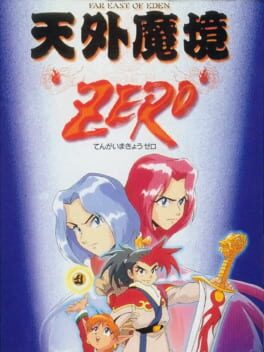

In the feudal Japan-like world of Jipang, an evil prince releases the demon lord Ninigi, who in turn seals the gods of Jipang and suppresses the people of six kingdoms with his demon henchmen. After one of the henchmen attack his village and slay his grandfather, the main character, Higan, learns he is the legendary "Fire Hero" and must set off to save the kingdoms. Along the way, Higan meets several characters, such as Subaru, a fairy and Tenjin, a swordsman. Tengai Makyo Zero is a 1995 role-playing video game developed by Red Company and published by Hudson for the Super Famicom. The game was released exclusively in Japan on December 22, 1995, and is the fourth installment in the Tengai Makyo series. Like several games in the Tengai Makyou series, it is based on the novel "Far East of Eden".
Reviews View More
This is an RPG. I tried looking up some info on GameFAQs, but all I got was a review from a self-important asshole who gave Dragon Quest VI a 3/10, and can obviously not read Japanese. So, it's an RPG, set in some kind of feudal Japan kind of setting, and it utilizes a real-time clock to some extent.
(editor's note: the first Tengai Makyou game fan translated, presaging last month's translation of Tengai Makyou II Ziria, Hudson's big answer to FF/DQ/SMT and considered to be their big entry in the JRPG canon, but the one I actually want to play is Tengai Makyou IV Apocalypse for its unique satire of America as opposed to Japan like the rest of the series, idk if it'll ever get translated though)
The combat is turn-based like most JRPG in the SNES, no real innovation here except maybe slightly in the scroll-fusion thing, where you will get an elemental scroll Water, Wind, Bolt, and Fire, then you can combine those scrolls to each other to use a magic, for example, you can make Waterwater, Waterbolt, FireBolt, etc. That might seem interesting, until you realize that all combinations are just different elemental attacks.
There’s also normal magic (still also called scroll), this one is your usual stuff: elemental attack, buff and debuff, though to be fair the buff and debuff is useful unlike most JRPG. The rest is your usual turn-based stuff. Nothing special.
What special is the setting, I don’t know if this is accurate but from what I played, the feudal Japan setting was very rare in JRPG at that time. However, despite the unique setting, the story is still pretty generic. Evil being that was sealed now awakened, it’s your task as the protagonist to defeat or seal it back by traveling around the world and freeing each nation from the tyranny of the evil being’s army. It… doesn’t really do much more than that.
The story is a bit humorous, not taking itself serious enough most of the time until the very end, heck I remember 2 overlord that was occupying a nation being a joke, one was an actual joke, and the other is just a grandma that helps you (albeit it is an attempt to deceive you later on, but it’s still kind of stupid). Other NPC is also pretty funny and I think it’s the strongest aspect of the game's storytelling despite how generic the main story is.
One other unique aspect of the game that I don’t really use but is very creative for its time (even today I’d argue, in JRPG at least), is the Personal Live Game System (PLGS). It’s essentially a real time event in the game, the basic example is your birthday, you’re asked to input your birthday at the start, and if it happens to be your birthday in the real world, the game will acknowledge it and give you rewards and events. Other examples are: festivals (in japan), where the game will celebrate it too if you’re playing on the festival date, there’s also a shop which only opens after a specific amount of time has passed in the real world, some shops also open only at a certain time of the day, etc.
The main problem with this system is that this game is a JRPG, not a life simulation like animal crossing. So there’s really no point in going back or waiting for a specific date to turn on the game just to see the festival after you beat the game, the game is very beatable without doing any of this PLGS.
I'm not sure if this is the best Tengai Makyoukai for me, but it's the only one I've ever played.
So I'm going to ignore all the history and reviews from the previous games, so please understand that.
It's an RPG with a friendly design even now, and the music and sound effects are so elaborate that it's incomparable to Dragon Quest and Final Fantasy of the same period.
There are battles between giant robots (though they are clay figurines, lol), so it's more flashy than DQ or FF.
The best part is that each village and city has its own famous products and 出合茶屋(deai chaya. A teahouse that existed in the Edo period for men and women to meet in secret.), so it's very well crafted.
Now that I think about it, I wonder how the SNES judging process worked?
It's an old game, but I highly recommend it.
